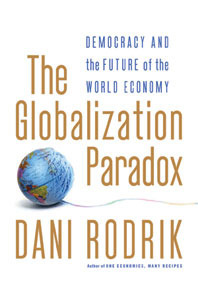Matthew Yglesias's Blog, page 2394
March 10, 2011
Chris Christie's Straight Talk Is Often Inaccurate
Richard Pérez-Peña of The New York Times has this crazy idea that for New Jersey Governor Chris Christie to qualify as a bold truth-teller the things he says should actually be true:
New Jersey's public-sector unions routinely pressure the State Legislature to give them what they fail to win in contract talks. Most government workers pay nothing for health insurance. Concessions by school employees would have prevented any cuts in school programs last year. Statements like those are at the core of Gov. Chris Christie's campaign to cut state spending by getting tougher on unions. They are not, however, accurate.
In fact, on the occasions when the Legislature granted the unions new benefits, it was for pensions, which were not subject to collective bargaining — and it has not happened in eight years. In reality, state employees have paid 1.5 percent of their salaries toward health insurance since 2007, in addition to co-payments and deductibles, and since last spring, many local government workers, including teachers, do as well. The few dozen school districts where employees agreed to concessions last year still saw layoffs and cuts in academic programs.
Pérez-Peña could learn a lot about journalism from Dana Milbank, who recognizes that the truth of Governor Christie's claims is irrelevant to assessing his status as a speaker of hard truths.


Libya Fact of The Day
On a per capita basis, though, twice as many foreign fighters came to Iraq from Libya — and specifically eastern Libya — than from any other country in the Arabic-speaking world. 84.1% of the 88 Libyan fighters in the Sinjar documents who listed their hometowns came from either Benghazi or Darnah in Libya's east.
On its own, that doesn't prove much of anything. But it's a reminder that there's no reason to just assume that Libyan rebels are nice folks on whose behalf we should launch a war with the Libyan government.


Language, Skills, and Distribution

(cc photo by princeroy)
Reader query:
Re: Bargining Power. A new flow of higher skilled individuals, check. Prefer low-skill Hispanophones to low-skill Anglophones? Why?
I may have put this poorly. It's not that I per se prefer immigrants from Mexico to immigrants from the Bahamas as that I'd like to navigate the ever-sticky politics of the immigration issue. Many people worry about the impact of immigration on the wages of native workers. And people aren't so much wrong about this as they are misestimating its scope. Human beings are not an undifferentiated mass of labor. Nor do people even slice simply into undifferentiated masses of "has a bachelor's degree" and "doesn't have a bachelor's degree." Doctors and architects are both college educated, but an influx of doctors doesn't reduce wages for architects. An influx of doctors could reduce the wages of doctors, but that's equivalent to saying it raises the real incomes of everyone else.
By the same token, you often can't substitute someone who doesn't speak English for someone who does. An increased flow of Hispanophone busboys increases demand for Anglophone waiters. Which is to say that the people negatively impacted by high levels of immigration from Latin America are people who are very similar to the immigrants, people with little education or ability to speak English. It would be interesting if what was happening in America is that recent immigrants were loudly demanding an immigration crackdown, but that's not what's happening (perhaps because people recognize that their bilingual children will benefit from a continued flow, or perhaps because immigration politics is really about identity). So it's important to try to get the Anglophone people who are complaining to better understand that we're benefitting from the increase in overall economic activity associated with the influx of people with complementary skills. Given the difficulty of doing that, it would be a mistake to understake some hypothetical new initiative to bring in a bunch of new workers who really would compete with native born low-skill Anglophones.
Higher-up the skill ladder, skills get more differentiated and the problem really goes away. Letting in more architects would be bad for architects, more doctors would be bad for doctors, more lawyers would be bad for lawyers, etc., but if we let in more professionals across the board then everyone would benefit since lawyers need health care and doctors need legal advice, etc.


Commerce Cabinet Crisis XIII: Sinclair Weeks

In January of 1953, Dwight David Eisenhower swept into office and finally ended the long Democratic Party hegemony in the White House. That presented, needless to say, an opportunity to restore the Commerce Department to the luster it enjoyed under the interwar GOP Presidents. But the opportunity was squandered, as Ike chose instead Charles Sinclair Weeks.
Weeks is a curious sort of character, who never seems to have actually done anything noteworthy but then would be randomly selected by other people for semi-important jobs. For example, he was Mayor of Newton, Massachusetts from 1930 to 1935 then went back to the business world. But in 1944 Governor Leverett A. Saltonstall needed a caretaker senator to fill a vacancy created by Henry Cabot Lodge, Jr.'s resignation and for some reason he picked Weeks. Then Weeks went back to business. In 1946 he became head of the American Enterprise Association, which he seems to have mostly run into the ground. He left in 1950, then a new group of conservative intellectuals revived it in 1952 and renamed it the American Enterprise Institute.
Ike was the last President to really attempt "cabinet government" whereby the president would decline to play a prominent leadership role in domestic policy and instead leave that role to his appointees. Despite this, Weeks appears to have continued the tradition of the Secretary of Commerce not being involved with any noteworthy initiatives.


The Truth About The Deadliest Catch
For reasons that aren't clear to me, the fishing industry is wildly more dangerous than any other line of work. But there's also significant variation among the varieties of fishing work. It turns out, however, that the Alaskan king crab fishery made famous by The Deadliest Catch is not, in fact, the deadliest of the lot. It's merely third deadliest. You need to come to the East Coast to really get involved in thrill seeking:
Groundfishermen in the Northeast suffer the highest death rate among commercial fishermen, according to a study recently published by the National Institute for Occupational Safety and Health. Twenty-six of 4,340 full-time groundfishermen died on the job between 2000 and 2009, the study found. The dubious honor of second-deadliest catch goes to Atlantic scalloping. Forty-four of 10,384 scallop fishermen lost their lives at sea during that same decade. By comparison, twelve of 4,658 Alaskan crab fishermen were killed.
I believe a groundfisherman catches cod, haddock and the like. The industry is also apparently in dire economic straights, though the knowledge that it's incredibly deadly puts that in a different perspective. I believe that's a higher death rate than serving in the Iraq War.


House GOP Budget Hammers The Special Olympics

Suzy Khimm reports on the latest round of lucky duckies to get the budgetary ax from House Republicans—disabled children:
The House GOP's budget, which passed last month, takes a hatchet to programs for disabled kids and Special Olympics athletes. The proposed cuts could force the closure of at least one Special Olympics program, which is funded through the Department of Education. Dubbed Project UNIFY, the program serves more than 750,000 students in 43 states and draws from techniques used in Special Olympics training for activities in public schools.
The program includes sports teams that pair disabled athletes with nondisabled athletes; developmental activities for young children with disabilities; and anti-discrimination programs to combat bullying in schools. Special Olympics president and CEO Tim Shriver has said the program is at the forefront of a national movement to fight bias against the disabled and, in a recent interview on MSNBC, he denounced the GOP cuts: "It wasn't a haircut—it was a guillotine job for the programs for health and education for children with special needs."
Now of course maybe people like that idea. Over the long term, the only way to meet America's budgetary commitments to senior citizens is either to raise taxes or else to slash all other programs. And lots of conservatives very sincerely believe that increasing American tax revenues to OECD average levels would somehow cripple economic growth. Others agree with Greg Mankiw that the impact of policy options on human welfare is irrelevant and tax hikes, even if they make people better off, are an immoral imposition on the genetic elite.
But I find that conservatives like to avoid facing up to what their ideas actually imply. Tyler Cowen, for example, says that "[b]alancing the budget within five to ten years with spending cuts alone would be difficult but by no means impossible." The link takes you to a piece of writing accompanied by a photograph of a smug-looking somewhat overweight middle-aged white man touting the "1 percent solution" to the federal budget. The idea here is that if we completely abstract away from what programmatic cuts would entail, it's possible, mathematically speaking, to achieve budgetary balance through a series of cumulative one percent cuts in outlays. Which, indeed, it is. Or else you can talk about the kids in the Special Olympics and how it would be immoral to redistribute resources to them from the alleged winners of the genetic lottery.
The good news is that David Koch has plenty of money and is a pretty generous guy, and could easily demonstrate his commitment to liberty to by offering to just pony up the $8.1 million out of pocket as a worthy investment in persuading skeptics that the small government agenda needn't come at the expense of the most vulnerable.


Peter King's Hypocrisy Is Fine By Eric Cantor Since "It's Pretty Obvious" Muslims Are The Problem

Amusingly, back in 2000 George W Bush got strong electoral support from Arab-Americans and from American Muslims. Today we have terrorist sympathizer Peter King conducting witch-hunt inquiries into the loyalty of American Muslims and Eric Cantor explaining he doesn't have a problem with King's record of support for terrorists, because the terrorists King likes aren't Muslims:
"I don't think there's any question about his credibility. … We have got demonstrable occurrences in this country that show we've got a risk of the spread of radical Islam. That's not within the security interests of the United States and its citizens; it's something that we really want to work with folks to see if we can stop," he said.
Asked about his expectations for the hearing and the controversy surrounding it, Cantor responded, "Really, it's one hearing out of many that he's having. I think you here in this room have sort of become fascinated with this hearing. And I would say to you it's pretty obvious where some of the problems have been in terms of terrorist activity."
Meanwhile, actual counterterrorism officials from the Defense and Treasury Departments say King's hearings will, if anything, make their jobs harder. But it's a small price to pay for trying to snag a little political boost through demagoguery.


Medicine and Intellectual Property

(cc photo by rodrigo senna)
Pursuant to this Kevin Drum story pharma horror story about a hundred-fold increase in the retail price of a drug that's useful for averting premature births, it's always worth pointing out that reforming how we incentive pharmaceutical research is some of the lowest-hanging fruit out there.
Even if we completely leave aside policy options that involve sticking it to the big drug companies, for any expected corporate revenue stream from a judge it would be welfare-enhancing for the federal government to pay a lump sum up front to have the drug released into the public domain rather than paying piecewise. In other words, if a company thinks it can maximize profits by charging $100,000 a pop for a pill that it expects to sell 10 of per year for 20 years, that comes out to $20 million in total revenue. But there are lots of people who might be helped by the pill who aren't going to be able to afford it at that price. If you just buy the patent for $20 million (less than that with appropriate discounting) then total spending is the same but more people will get treated. In other words, we should be funding this research with prizes, not patents, as Joe Stiglitz lays out here. Bernie Sanders is the congressional champion of this idea, but it also garners support from libertarians like Alex Tabarrok. The Obama administration Office of Management and Budget is also doing some good things on this.


The Globalization Paradox

Dani Rodrik's new book The Globalization Paradox: Democracy and the Future of the World Economy is a pretty good book lurking behind a terrible framing device. So to start with the framing device, the conceit here is that we have a trilemma—democracy, national self-determination, and globalization. Upon scrutiny, however, this actually has almost nothing to do with political democracy. What you're actually left with is a tension between self-determination (where national governments decide what they want to do) and globalization (which requires national governments to all more or less do the same thing) and the right answer is, obviously, that which is best depends on context.
On to the book! It's almost like three books in one. One is about the limits of the "Washington Consensus" as advice to developing countries. It's a good book, though not necessarily better than his earlier One Economics, Many Recipes which covers similar ground. The second book is about the WTO and trade policy. Trade skeptics will love the rhetoric, but should pay attention to the actual policy proposals which are very modest. The provocative (but seemingly well-founded) point here is that the Doha Round issues are actually not a big deal growth-wise and the level of elite focus on pushing them reflects a kind of ideological fetishism more than anything else. He suggests that political capital and energy would be better expended on liberalizing immigration.
The third book, which I wish he'd just done as the whole book, is about "financial globalization" and how it went very bad. These aren't the terms he uses, but I think the point he's making about this is that total lack of capital controls makes it very difficult to do effective macroeconomic stabilization so you end up with large output gaps so even if you assume that there's some microeconomic inefficiencies associated with capital controls you still end up with more robust, more stable growth if you have controls. It takes a lot of Harberger triangles to fill an Okun gap is, I believe, the phrase for it. This seems very persuasive to me. Obviously, one could go too far with capital controls but the point is that the regulatory regime should do what it needs to do to meet its goals, and not treat the imperatives of globalization as a unshakeable impediment to creating a well-regulated system.
If you have some specific reason to think your country is in need of a large infusion of foreign cash seeking short-term profits, then of course it's time to re-evaluate, but there doesn't seem to be any reason to think this is a widespread problem.


The Possibilities of Slugging
I really liked Emily Badger's article on the practice of "slugging" in DC's Virginia suburbs. This is a kind of loosely structured car pooling, where people give strangers rides in order to gain access to HOV lanes.

It's worth your time just as a piece of journalism, but also because I think slugging gestures in the direction of the point that congestion pricing would work well even in places that don't have an extensive mass transit infrastructure. When the incentive exists to share rides—which is what happens with a per vehicle congestion charge—a relatively simple and low cost infrastructure can do a lot to facilitate it. Now obviously I'm a fan of mass transit and dense urban development, but I think it's an important point anyway because people sometimes think there's much more of a chicken and egg problem here than really exists. What's more, it's important to see that congestion pricing can easily be a revenue-positive measure that can be used to reduce sales taxes (if you're concerned about the distributive implications) or to cut marginal income tax rates on rich people (if you're a Republican).


Matthew Yglesias's Blog
- Matthew Yglesias's profile
- 72 followers



